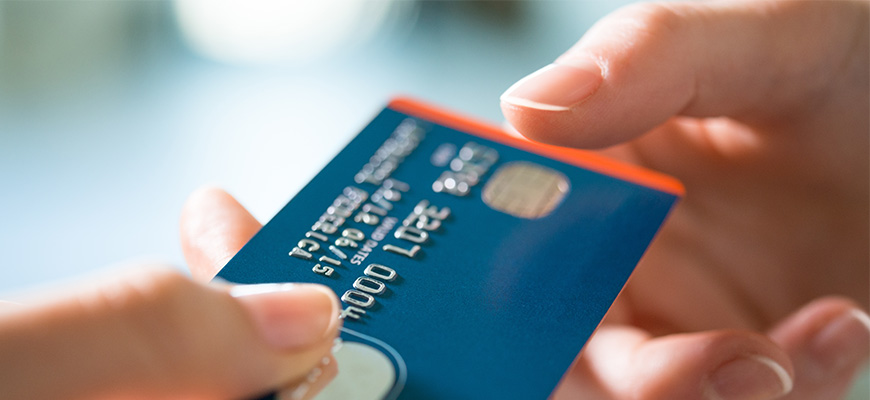A secured credit card works like a traditional or unsecured credit card in every way. The only difference is that you’re required to make a security deposit when you open a secured credit card. The lender holds onto your deposit to use to pay off your balance if you stop making your payments in the future.
Because this security deposit makes it less risky for a lender to issue a secured card, they’re a lot easier to get approved for, making secured cards is a great tool to build credit if you lack credit history or have bad credit.
What is a Secured Credit Card?
A secured credit card is backed by a cash or security deposit from the card owner. How much money you’re required to put on the card is based on your unique credit profile and the card issuer’s requirements. Let’s say the credit limit you’re approved for is $1,000. You’ll give the lender a cheque for $1,000 as a security deposit and they in turn give you a card with $1,000 on it to spend. If you don’t make your payments, the lender will claim that security deposit against any outstanding charges.
A secured credit card is different from a debit card or prepaid credit card as it helps you build your credit. This is because the issuer of the card usually reports to a credit bureau to provide details about your activity. This includes information such as your payment history and credit utilization (how much of your available credit you’re using each month).
Consider it this way: when you pay for something with a debit card, you’re using your own money. When you pay for something with a secured credit card—even though you have paid upfront for the card—you're using the lender’s money and then repaying them. Think of your security deposit as being held in a bank vault, only accessed if you don’t repay the amount owing on your card.
How Does a Secured Credit Card Build Credit?
If this is your first time using credit or if you’re looking to rebuild your credit score after a negative financial event, a secured credit card can be very beneficial.
Predetermined Credit Limit:
A secured credit card only lets you spend up to a predetermined credit limit based on the size of your deposit. As such, it’s a good way to learn how to use credit responsibly because you aren’t in as much danger of overspending and owing more money than you can afford to pay back.
A secured card can also help you build a good credit score, so that you can eventually qualify for a traditional unsecured credit card and even a mortgage.
Reports Payment to Credit Bureaus:
Before signing up for a secured card, make sure it reports to the two major credit bureaus in Canada: Equifax and TransUnion. If you sign up for a secured card that only reports to one, it won’t be as helpful for boosting your score.
If you sign up for one that doesn’t report to any, it won’t help improve your credit score at all, so be sure to ask in advance.
Who Should Use a Secured Credit Card?
A secured credit card is a great option for those who need to build their credit and may not be able to access more traditional unsecured credit cards. If you’re working to re-establish your credit after an insolvency, if you’re new to Canada, or if you’re a young Canadian new to using credit, a secured credit card can help you build your credit history.
Tips for Using a Secured Credit Card
If you’re looking to improve your credit score, a secured credit card is a good place to start.
Pay the Full Statement Balance On Time:
Your payment history is the most important factor when it comes to your credit score, so you want to try and make all your payments on time, and ideally you want to pay the full amount owing. However, if you can’t afford to do that, you want to make at least the minimum payment. That’s because late or missed payments are harmful to your credit score. By signing up for a secured card and making all your payments on time, it can go a long way to improving your credit score.
Keep your Credit Utilization Low:
Another important factor that can affect your credit score is credit utilization, which determines around 30% of your credit score. Simply put, your credit utilization is how much credit you’ve used up compared to the total amount of credit available to you. You should always aim to keep your credit utilization below 30%. If you are looking to improve your credit score to buy a house or get a loan, it is important to know how much of your total available credit is being used and to keep it at the lowest amount possible.
Have the Full Security Deposit Amount:
Most secured credit card companies require you to deposit at least $200 with your application. The higher your deposit, the higher your credit limit and the more purchases you can make with your card.
When you first start using a secured credit card, it is important to know that your credit limit will be the same as your deposit. You will want to choose an amount that gives you some spending flexibility without putting yourself in financial jeopardy.
How to Apply for a Secured Credit Card?
Before you apply for a secured credit card, you’ll want to make sure you have the minimum deposit saved, otherwise you won’t be approved.
You may or may not need to have your credit checked, but as long as you’re able to make the deposit, you’re almost certain to be approved for a secured card.
However, if you’re new to Canada, you’ll want to double check if you qualify, as some secured credit cards may require that you’re a Permanent Resident before approving your secured card application.
In some instances you may need to pay a fee to apply for a secured credit card. This is different from your deposit, and is most often a one-time set up fee.
Step by Step Process:
Apply for a Secured Card
Make Your Deposit
Use Your Secured Card
Get Your Deposit Back
How Fast Will a Secured Card Build Credit?
Generally speaking, you will start building credit immediately with a secure credit card. However, if your goal is to qualify for the approval of other forms of credit, lenders typically want to see that you have at least six months to a year of using a secured credit card before they will consider letting you sign up for an unsecured credit card.
That’s because lenders want to see that you have a proven track record showing that you’re able to make your payments on time with a secured card before graduating you to an unsecured card.
When Can I Switch from a Secured to Unsecured Credit Card?
It depends on your current credit situation. If you’re starting with a clean slate and you don’t have any credit history at all, you may be able to switch from a secured to an unsecured credit card in as little as six months.
If you’re re-establishing your credit after a detrimental credit event, such as a bankruptcy or consumer proposal, you can expect it to take longer.
If possible, you want to “graduate” your existing secured credit card to an unsecured card. That way, you won’t lose any of the credit history and positive track record you’ve built with your secured credit card.
Secured Credit Card vs. Unsecured Credit Card: What's the Difference?
Secured credit cards and unsecured credit cards work almost identically, but there are some key differences between the two.
With a secured credit card, you’re required to make a security deposit to be issued the card, while you don’t need to make this kind of deposit with an unsecured card. Your credit limit for a secured credit card is based on the size of your security deposit, while your credit limit for an unsecured credit card is based on other factors like your credit score and income.
Unsecured credit cards tend to come with benefits like cashback and reward points, while secured credit cards rarely offer these kinds of benefits.
The advantage of secured credit cards is that they’re a lot easier to be approved for than unsecured cards, making them a great credit-building tool for those with no credit history or a low score.
Which Credit Card Is Right for Me?
If you’re new to credit or have bad credit, you might only be able to qualify for a secured credit card. However, if you’ve had a secured credit card for several months and you’ve done a good job of making all of your payments on time, that’s when you might consider switching to an unsecured credit card.
Some Canadians just prefer secured credit cards. If you’ve run into spending issues in the past, a secured credit card helps keep your spending in check, by only letting you spend up to the amount that you’ve given as a deposit.
This differs from an unsecured credit card where you can spend a lot more and make a bad credit situation even worse if you aren’t disciplined with your credit usage.
The Bottom Line
A secured credit card can be a great way to build or rebuild your credit if you lack a credit history or simply have bad credit. By using it responsibly, you can be well on your way to a good credit score and qualifying for an unsecured credit card.

Trusted by over 3 million Canadians, Borrowell provides free weekly credit scores and report monitoring, personalized financial product recommendations and affordable tools to help you build your credit. Sign up for your free Borrowell account today on borrowell.com, or download the mobile app for Android or iOS.




